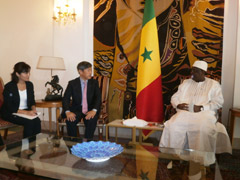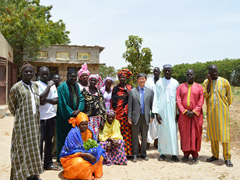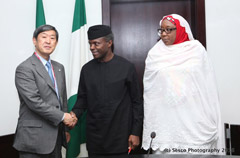JICA President Shinichi Kitaoka visited the countries of Senegal and Nigeria in West Africa from June 12 to 17.
Senegal is a stable democratic country on the far western edge of the African continent. It is a base for JICA's assistance in West Africa and in the Sahel. Also, Nigeria is known as “the giant of Africa”, with the largest population and economy in Africa.
While in the two countries, Mr. Kitaoka held talks with Senegalese President Macky Sall, Nigerian Vice President Yemi Osinbajo, Nigerian Minister of Budget and National Planning Udoma Udo Udoma and other dignitaries and visited the sites of JICA projects.
This visit was an opportunity to reconfirm African leaders' expectations for and faith in Japan ahead of the sixth Tokyo International Conference on African Development (TICAD VI), which will be held in Africa for the first time, in August this year. Also, JICA, while providing cooperation to Africa, has sent a consistent message through mutual visits and dialogue based on ownership and partnership: Assistance is needed that encourages economic growth based on peace and stability while ensuring that the weakest members of society are not left out of the benefits of growth.
1. Visit to Senegal
Mr. Kitaoka held talks with Mr. Sall on Tuesday, June 14. Mr. Sall expressed his appreciation to Japan for its cooperation that meets Senegal's needs based on its national development policy, the Emerging Senegal Plan (PSE), and for having dispatched to Senegal one of the largest numbers of Japan Overseas Cooperation Volunteers (JOCVs) in the world so far. Mr. Kitaoka emphasized his expectation that the partnership between the two countries, which has spanned many years, will continue as TICAD VI approaches. He also once again emphasized the importance of both development and "peace and stability."

JICA President Shinichi Kitaoka, center, and Senegalese President Macky Sall, right, hold talks.
During his stay in Senegal, in the capital of Dakar, Mr. Kitaoka visited the Senegal-Japan Vocational and Technical Training Center (CFPT) and the Central Fish Market of Dakar, both the results of long years of cooperation. He also visited the village of Taïba Ndiaye, Thiès Region, where he saw for himself water supply facilities built with Japanese grant aid and the activities of a water management association whose capacity was strengthened through technical cooperation.

JICA President Shinichi Kitaoka (center), who was visiting the village of Taïba Ndiaye, Thiès Region, in Senegal, with local residents involved in the water management association
He visited the Yombal Fadji health mutual aid association, which is an initiative to achieve Universal Health Coverage (UHC)(*1) and the site of steady activities to spread the health insurance system. Achieving UHC is an objective of the Sustainable Development Goals. At the association, he heard unfiltered opinions about achieving UHC. He also visited Gaspard Camara Health Center, where the technical cooperation “Project for Reinforcement for Maternal and New Born Health Care (Phase 2)” is being implemented. Mr. Kitaoka watched expectant and nursing mothers being cared for based on the concept of "humanized childbirth," explained by Japanese experts and center staff who are also engaged in 5S(*2) activities. In so doing, Mr. Kitaoka got a feel for the current situation regarding diverse support for UHC in Senegal while deepening his understanding of the fact that it is essential to expand health services both qualitatively and quantitatively to achieve UHC.
At sites of cooperation in the areas of water supply and health care, Mr. Kitaoka received the impression that community steering committees are playing an important role and that Senegalese communities' strong unity and capacity for independent action in response to problems will be extremely important in solving problems such as poverty facing the country.
Mr. Kitaoka also interacted with JOCVs dispatched as Japanese language teachers and their students, as well as students planning to study in Japan under the Master's Degree and Internship Program of the African Business Education Initiative for Youth (ABE Initiative)(*3). He spoke some words of encouragement to them.
Through this visit, Mr. Kitaoka confirmed that Senegal is advancing its development through teamwork and respect for others — an approach it has in common with Japan — and that with Japan's strengths of health care, education, agriculture/marine products and infrastructure matching Senegal's needs, the two countries are cooperating to achieve a development effect.
(*1) Universal Health Coverage (UHC)
UHC refers to "the ability of all people to receive appropriate services related to health promotion, prevention, medical treatment and functional recovery at a cost they can afford to pay."
(*2) 5S
A term named for the first letters of the steps of "Sort, Set, Shine, Standardize and Sustain"
(*3) ABE Initiative
The Master's Degree and Internship Program of the African Business Education Initiative for Youth (ABE Initiative) offers 1,000 young Africans an education at a Japanese university or graduate school and a chance at an internship at a Japanese company.
2. Visit to Nigeria
Mr. Kitaoka held talks with Mr. Osinbajo on June 16. Mr. Kitaoka talked about visiting a camp for internally displaced persons created by Boko Haram and said the smiling faces of the children there and the camp's atmosphere gave him a hopeful impression. Mr. Osinbajo said that if people's livelihoods do not improve and they remain in poverty, they may start to admire extremism, so it is important to raise orphans affected by the battle with Boko Haram in a stable environment.
During his meetings with such dignitaries as Mr. Osinbajo and Mr. Udoma, they agreed to further strengthen the cooperative relationship between the two countries ahead of TICAD VI.
Mr. Kitaoka visited the sites of JICA cooperation projects during his stay in Nigeria. At the site of the technical cooperation, “Federal Capital Territory Reduction of Non-Revenue Water Project,” he saw Japan's efficient non-revenue water techniques being put to work and employees of Nigeria's Federal Capital Territory Water Board receiving technical guidance. The topics of this guidance included a water leakage investigation.
On June 17, the last day of his stay, Mr. Kitaoka visited the site of solar power equipment installation at the Lower Usuma Dam Water Treatment Plant on the outskirts of the Nigerian capital of Abuja. His visit was related to the grant aid, “Project for Introduction of Clean Energy by Solar Electricity Generation System.” He confirmed that Japan's solar power generation technology will greatly reduce the cost of electricity necessary to operate a water treatment plant and is contributing to the promotion of renewable energy initiatives of the Nigerian government.

Nigerian Vice President Yemi Osinbajo, center, and JICA President Shinichi Kitaoka, left, who met with him.

JICA President Shinichi Kitaoka inspects a camp for internally displaced persons in the capital city of Abuja, Nigeria.

JICA President Shinichi Kitaoka is interviewed by members of the local media while checking on the status of installation of solar panels at the site of a grant aid project.




scroll